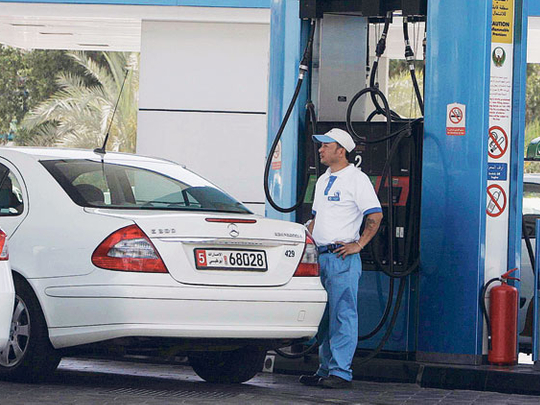
Abu Dhabi: The average subsidy on petrol in the UAE at prevailing international crude prices is about Dh0.32 per litre, which builds up a case for the country's four oil retailers to seek a third straight increase this year in the state-set petrol prices, local oil industry sources said yesterday.
However, the UAE government is yet to take a decision on the issue. The pricing of oil products is a sensitive matter and fuel price hikes invariably stoke inflationary pressures as producers of goods and services tend to pass on the increase in transportation costs to consumers.
Also, the current petrol prices in the UAE are now only slightly behind the benchmark $2.17 per gallon price for US gasoline futures. The country's gasoline prices are also well above those prevailing in the neighbouring countries of Saudi Arabia and Oman.
The UAE oil retailers are losing about Dh0.40 per litre on domestic sales of petrol — Special [95 octane] and Super [98 octane] grades at prevailing international prices, company sources told Gulf News. The loss for the E-Plus petrol grade, which is sold only at the pumps of Adnoc Distribution, is about Dh0.15 per litre.
The oil distribution companies in the country are: Adnoc Distribution, a unit of the Abu Dhabi National Oil Company (Adnoc), and Dubai-based retailers Emirates National Oil Company (Enoc), Emirates Petroleum Products Company (Eppco) and Emarat.
The petrol subsidies are borne by the government. The UAE announced plans earlier this year to gradually reduce subsidies on petrol, which cost the government hundreds of millions of dirhams a year, until prices match international market levels.
Various petrol grades across the pumps in the country currently sell in a price range of Dh1.61 to Dh1.83 per litre.
While national subsidy figures are not made public, Abu Dhabi has spent an average of $6.5 billion a year for the past four years on various subsidies, from water to energy, Reuters said, quoting official data.
"The subsidies are unsustainable and are particularly affecting the oil retailers in Dubai who buy petrol from the international market and from Abu Dhabi National Oil Company at market prices," said an oil company source.
While Abu Dhabi processes its own crude at its two refineries for petrol, Dubai has to buy all its petrol from outside.
When the price of oil in the international markets shoots up, Enoc, Eppco and Emarat become particularly vulnerable as the difference between the purchase price and the local selling price of petrol becomes even wider. The oil companies cannot unilaterally change pump prices without the government's intervention.
Effective July 15, the UAE's oil marketing companies raised petrol prices by Dh0.20 a litre, the second increase this year. The oil marketing firms said at the time the increase was part of a gradual liberalisation of prices to mitigate their accumulated and growing losses due to a continuous surge in the cost of crude.
Kate Dourian, Middle East Editor of Platts, a global energy information provider, feels the domestic oil product consumption of Gulf countries has been increasing rapidly in recently and unless these nations rethink their policy on state-controlled fuel prices, they will have a lot less oil to export.
Another petroleum expert, who didn't want to be identified, said raising petrol prices to market levels would be a good move.
"Most people who drive cars in the UAE are above the poverty line. They can afford to pay for the fuel. Aligning the domestic petrol prices with the market would cut wasteful fuel consumption and help the environment," he said. Demand for oil products in the UAE is expected to rise by 3 per cent in 2010 to 304,000 barrels per day (bpd), according to Washington-based consultancy PFC Energy.
The UAE currently exports close to 2.3 million bpd of crude oil of which Abu Dhabi's contribution is more than 90 per cent. According to the Statistical Yearbook of Abu Dhabi 2010, total domestic sale of refined petroleum products in Abu Dhabi in 2009 was 1,593 million imperial gallons in 2009.












